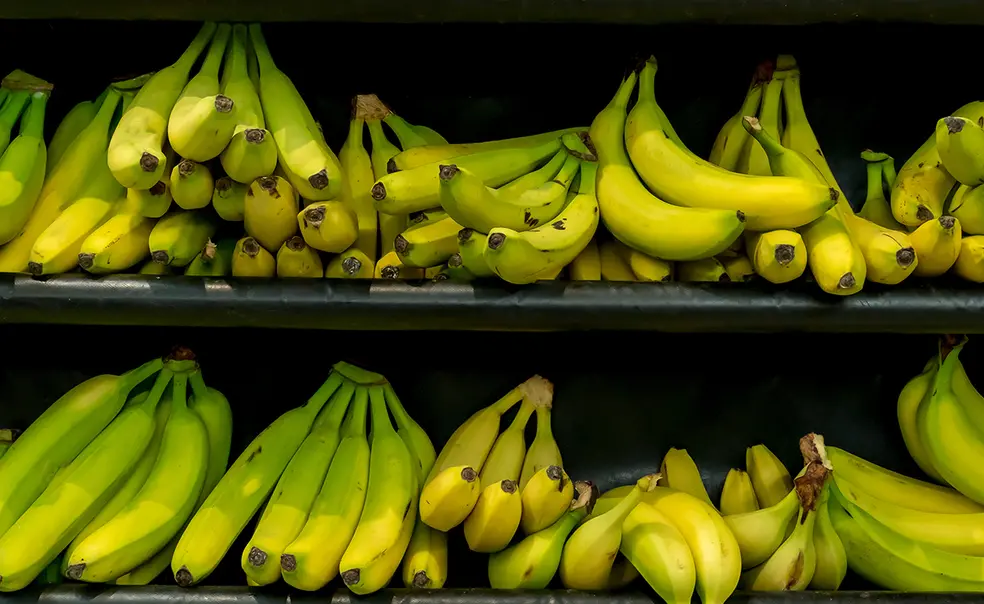Green Bananas and Other Eschatological Concerns
A milestone birthday inspires thoughts about ‘the last things,’ from dress shoes to class reunions
“At my age, I don’t even buy green bananas.”
— Comedian George Burns, speaking in his 90s.
At age 80, I still buy green bananas, but I find myself wondering about the wisdom of a lot of other purchases.
I turned 80 last fall. You might think that by then, birthdays would have lost their impact. That had been true for a while, but there was something about my 80th that demanded attention. I couldn’t pretend turning 80 didn’t feel like a significant milestone.
For the most part, reaching that milestone feels good. I feel good that, although retired, I still can — and do — don suit and tie each weekday morning and drive to my old law firm to spend the morning writing articles, columns, and (usually angry) letters to the editor. I feel good that my articles and columns, and a few letters, get published.
On the debit side of the ledger, I regret the physical limits imposed by age: loss of flexibility after back surgery, some shortness of breath climbing stairs, and inability to attend to home maintenance chores I handled easily (albeit grumpily) for 50 years.
All in all, it’s a net positive: At 80, the pluses far outnumber the minuses.
But one concern now weighs on me, one that arrived like an unwanted 80th birthday present. Ironically, it arrived in the context of thinking about — of all things — birthday presents. When my wife asked what presents I wanted, this question hit me: Does it make sense for an 80-year-old to request items that will last a lot longer than he will?
This is a variation on the tongue-in-cheek concern in the Burns quip. He worried he’d die before the bananas were ripe. I worry that because my life expectancy is shorter than the useful lives of a whole range of purchases, acquiring them would be unwise, even foolish. For example, I assume that once a man reaches 80, he shouldn’t expect a speedboat or pool table for his birthday.
These examples are easy because they’re very expensive and completely discretionary. But what about items that are somewhat expensive but not actually essential — items I’ve routinely purchased without thinking about the price? It’s these that concern me.
I think of this concern as eschatological because in religion (my concentration at Princeton and later at Yale), eschatology is the study of the last things — the end of history. My concern focuses on what may well be my last things and the approaching end of my history.
Take my Mont Blanc pen. In the past, if I lost it, I’d automatically replace it with a duplicate. Now, I’d wonder whether I had enough pen-writing days left to warrant the investment.
Or my cherished pocket watch. When I wear a suit, I feel naked without it. In the past, if it stopped, I ordered an expensive repair. Would that still make sense, especially when, like everybody else, I check the time with my smart phone?
If one of my suits wears out, do I replace it? Doesn’t the answer require estimating how long I’ll keep going to the office regularly? How long I’ll live? Should I consult an actuary?
Or dress shoes. I’ve always had three pairs: black, cordovan, and brown. What if a pair wears out, or heaven forbid, two pairs?
I’d have three choices: One, replace the shoes with the brand I’ve always worn. But that brand is expensive. Obviously, at 80 I’ve lost a step or two. Do I have enough steps left to warrant the investment? Remember, even an open casket hides the shoes.
Two, replace them with a less expensive brand. Or three, limp along with the remaining shoes. But that would require compromises I’ve never made. Do I want to be the old guy who wears brown shoes with a charcoal suit?
More importantly, aren’t both options two and three acknowledgement that I’m giving up, winding up my affairs? Am I ready to make that acknowledgement? To my colleagues? To the world? To myself?
My concern isn’t limited to material goods. What about experiences? Will my next Princeton reunion be the last I attend? Should I act as though it is? Should I try remembering it that way in case that turns out to be the case?
Or relationships? When I’m with a very old relative or friend, I’m often aware it might be our last visit. Is it now my age that raises that possibility?
I don’t know the answers. I do know the questions are new to me — as I said, an unwanted 80th birthday present.
If you have any advice, I’d welcome it. But don’t wait too long. I’m 80.












1 Response
Norman Ravitch *62
1 Year AgoGifting Advice
I’m in my late 80s, and the best gift is alcohol: bourbon or wine or both.